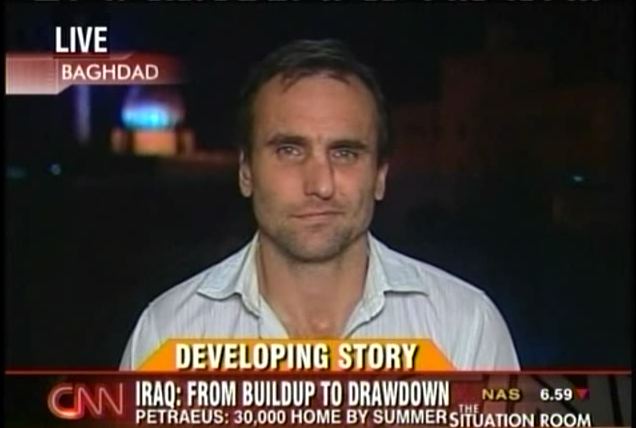TSR: "...it's given time for America to begin developing Sunni militias."

Length: 4:25
LARGE (51.8 MB) ----- SMALL (5.1 MB)
WOLF BLITZER: Americans are skeptical that the troop increase in Iraq is bearing fruit. A new CNN/Opinion Research Corporation poll out today shows 54 percent believe it's failing. Just 40 percent believe it's succeeding.
The U.S. ambassador, Ryan Crocker, told Congress today that he can't guarantee success. But he issued a dire warning about giving up in Iraq.
(BEGIN VIDEO CLIP)
RYAN CROCKER, U.S. AMBASSADOR TO IRAQ: I am certain that abandoning or drastically curtailing our efforts will bring failure. And the consequences of such a failure must be clearly understood by us all. An Iraq that falls into chaos or civil war, will mean massive human suffering well beyond what has already occurred within Iraq's borders.
(END VIDEO CLIP)
BLITZER: Let's get a closer look on the reality on the ground.
Joining us now, our correspondent in Baghdad, Michael Ware.
That's a very dire assessment from Ambassador Ryan Crocker. As bad as the situation is right now, if the U.S. starts leaving, it's going to be so much more painful, so much worse.
Is that a fair assessment from the ambassador?
MICHAEL WARE, CNN CORRESPONDENT: Wolf, the ambassador has hit the nail directly on the head. I mean, any kind of withdrawal, precipitous or not, right now by U.S. forces would create a vacuum, or certainly pockets of vacuum, that would immediately be filled by elements either hostile to America or certainly destabilizing in the region. There is no way America can pull out just yet.
And the withdrawal, so-called, that General Petraeus is flagging, much welcome to weary American ears back home and the families of troops, but let's face reality. Firstly, these troops were pretty much going home next year anyway. It was the end of the so-called surge or the escalation. It was a one year deal.
And let's not forget, too, that the relief that's being provided in Anbar that might allow Marines and others to go home is essentially built on the back of a deal cut with the Sunni insurgency and the tribes -- the Sunni tribes. It's become ironic that whilst the surge has achieved many of its military objectives and violence levels have dropped, but for a myriad of reasons, rather than buying political breathing room for the Iraqi government to stand up, what, in fact, has happened is it's given time for America to begin developing Sunni militias -- Sunni militias that are either going to prod the Maliki government into action or will help preserve U.S. interests as things devolve -- Wolf.
BLITZER: I was struck at the beginning of Ambassador Crocker's testimony, Michael, how he made comparisons to the early years of America's own independence during the Revolutionary days. It took a long time to deal with issues like slavery and suffrage, women's rights, civil rights, and that people should be patient with this new Iraqi government.
So here's the question, in a nutshell: is Nouri Al-Maliki, the Iraqi prime minister, George Washington?
WARE: Oh, no way. Absolutely not. He's not even a Hamid Karzai, the unifying president of Afghanistan. There's no one unifying figure waiting in the wings here in Iraq and certainly there's not one in the prime minister's chair right now. And I must admit, I was surprised to hear Ambassador Crocker harken back to America's constitutional and revolutionary history. That is such an old and tired line that we've heard trotted out almost since the beginning of the invasion in 2003.
Most significantly, though, Wolf, really what we've just witnessed in this testimony is the shifting nature of the war in Iraq. Wolf, it's changed.
How little did you hear Al Qaeda mentioned and how much did you hear Iran mentioned?
Wolf, we are now ushering in -- we are welcoming the real proxy war between America and Iran. We're about to see that become the true rivalry in this country.
BLITZER: Michael Ware on the scene for us in Baghdad, as he has been for the last four years.
So, Michael, thanks very much for that.
WARE: Thank you.
BLITZER: Let's go to Jack Cafferty in New York with The Cafferty File -- Jack.
CAFFERTY: You know, he's even better than you are.
BLITZER: He's much better than I am. He's not as good as you, though.
CAFFERTY: Oh, he's terrific. I enjoy Michael a lot.
